- Home
- Lewis Carroll
Jabberwocky and Other Nonsense Page 9
Jabberwocky and Other Nonsense Read online
Page 9
Say rather, more!
80 So may my course for ever smoothly run,
And onward swell
In that smooth channel where it hath begun:
Still climbing, climbing up the classic heights
Where Fame doth dwell
And still
I will
From month to month, from week to week,
Devote my drowsy days and wakeful nights
To Greek.”
[90] Such were the fancies of his lighter mood –
His lighter mood, which very seldom came:
But now my Muse, approaching higher themes,
Shrinks from the task in trembling, for the field,
Green and smooth-shaven, spreads before her sight;
The wickets pitched, the players ranged around;
And he, the hero, in his glory there;
A sight to dream of, not to write about!
Then fare thee well, greatest of little men,
In Greek, in Latin, in the cricket-field:
[100] Great as a bowler, greater as a bat,
But as a “short slip” greater yet than that!
CLD. MAY 23. 1853
[From a letter to his younger sister and brother Henrietta and Edwin, 31 January 1855]
The questions are shouted from one to the other, and the answers come back in the same way – it is rather confusing till you are well used to it.
The lecture goes on something like this.
Tutor. “What is twice three?”
Scout. “What’s a rice tree?”
Sub-Scout. “When is ice free?”
Sub-sub-Scout. “What’s a nice fee?”
Pupil (timidly). “Half a guinea!”
Sub-sub-Scout. “Can’t forge any!”
Sub-Scout. “Ho for Jinny!”
Scout. “Don’t be a ninny!”
Tutor. (Looks offended, but tries another question). “ Divide a hundred by twelve!”
[10] Scout. “Provide wonderful bells!”
Sub-Scout. “Go ride under it yourself.”
Sub-sub-Scout. “Deride the dunder-headed elf!”
Pupil (surprised). “Who do you mean?”
Sub-sub-Scout. “Doings between!”
Sub-Scout. “Blue is the screen!”
Scout. “Soup-tureen!”
And so the lecture proceeds.
Upon the Lonely Moor
I met an aged, aged man
Upon the lonely moor:
I knew I was a gentleman,
And he was but a boor.
So I stopped and roughly questioned him,
“Come, tell me how you live!”
But his words impressed my ear no more
Than if it were a sieve.
He said, “I look for soap-bubbles,
[10] That lie among the wheat,
And bake them into mutton-pies,
And sell them in the street.
I sell them unto men”, he said,
“Who sail on stormy seas;
And that’s the way I get my bread –
A trifle, if you please.”
But I was thinking of a way
To multiply by ten,
And always, in the answer, get
[20] The question back again.
I did not hear a word he said,
But kicked that old man calm,
And said, “Come, tell me how you live!”
And pinched him in the arm.
His accents mild took up the tale:
He said, “I go my ways,
And when I find a mountain-rill,
I set it in a blaze.
And thence they make a stuff they call
[30] Rowland’s Macassar Oil;
But fourpence-halfpenny is all
They give me for my toil.”
But I was thinking of a plan
To paint one’s gaiters green,
So much the colour of the grass
That they could ne’er be seen.
I gave his ear a sudden box,
And questioned him again,
And tweaked his grey and reverend locks,
[40] And put him into pain.
He said, “I hunt for haddocks’ eyes
Among the heather bright,
And work them into waistcoat-buttons
In the silent night.
And these I do not sell for gold,
Or coin of silver-mine,
But for a copper-halfpenny,
And that will purchase nine.
“I sometimes dig for buttered rolls,
[50] Or set limed twigs for crabs;
I sometimes search the flowery knolls
For wheels of hansom cabs.
And that’s the way” (he gave a wink)
“I get my living here,
And very gladly will I drink
Your Honour’s health in beer.”
I heard him then, for I had just
Completed my design
To keep the Menai bridge from rust
[60] By boiling it in wine.
I duly thanked him, ere I went,
For all his stories queer,
But chiefly for his kind intent
To drink my health in beer.
And now if e’er by chance I put
My fingers into glue,
Or madly squeeze a right-hand foot
Into a left-hand shoe;
Or if a statement I aver
[70] Of which I am not sure,
I think of that strange wanderer
Upon the lonely moor.
From “Novelty and Romancement: A broken spell”
[“ ‘When Desolation snatched her tearful prey”]
“When Desolation snatched her tearful prey
From the lorn empire of despairing day;
When all the light, by gemless fancy thrown,
Served but to animate the putrid stone;
When monarchs, lessening on the wildered sight,
Crumblingly vanished into utter night;
When murder stalked with thirstier strides abroad,
And redly flashed the never-sated sword;
In such an hour thy greatness had been seen –
[10] That is, if such an hour had ever been –
In such an hour thy praises shall be sung,
If not by mine, by many a worthier tongue;
And thou be gazed upon by wondering men,
When such an hour arrives, but not till then!”
Alice, daughter of C. Murdoch, Esq
O child! O new-born denizen
Of life’s great city! On thy head
The glory of the morn is shed,
Like a celestial benison!
Here at the portal thou dost stand,
And with thy little hand
Thou openest the mysterious gate
Into the future’s undiscovered land,
I see its valves expand,
[10] As at the touch of Fate!
Into those realms of love and hate,
Into that darkness blank and drear,
By some prophetic feeling taught,
I launch the bold, adventurous thought,
Freighted with hope and fear;
As upon subterranean streams,
In caverns unexplored and dark,
Men sometimes launch a fragile bark
Laden with flickering fire,
[20] And watch its swift-receding beams,
Until at length they disappear,
And in the distant dark expire.
From “The Legend of Scotland”
[“Lorenzo dwelt at Heighington”]
Lorenzo dwelt at Heighington,
(Hys cote was made of Dimity,)
Least-ways yf not exactly there,
Yet yn yts close proximity.
Hee called on mee – hee stayed to tee –
Yet not a word he ut-tered,
Untyl I sayd, “D’ye lyke your bread
Dry?” and hee ans
wered “But-tered.”
Noodle dumb
[10] Has a noodle-head,
I hate such noodles, I do.
[“Here I bee, and here I byde”]
Here I bee, and here I byde,
Till such tyme as yt betyde
That a Ladye of thys place,
Lyke to mee yn name and face,
(Though my name bee never known,
My initials shall bee shown,)
Shall be fotograffed aright –
Hedde and Feet bee both yn sight –
Then my face shall disappear,
[10] Nor agayn affrite you heer.
[“ ‘Yn the Auckland Castell cellar”]
“Yn the Auckland Castell cellar,
Long, long ago,
I was shut – a brisk young feller –
Woe, woe, ah woe!
To take her at full-lengthe
I never hadde the strengthe
Tempore (and soe I tell her)
Praeterito!”
“She was hard – oh, she was cruel –
[10] Long, long ago,
Starved mee here – not even gruel –
No, believe mee, no! –
Frae Scotland could I flee,
I’d gie my last bawbee, –
Arrah, bhoys, fair play’s a jhewel,
Lave me, darlints, goe!”
[“Into the wood – the dark, dark wood”]
Into the wood – the dark, dark wood –
Forth went the happy Child;
And, in its stillest solitude,
Talked to herself, and smiled:
And closer drew the scarlet Hood
About her ringlets wild.
And now at last she treads the maze,
And now she need not fear;
Frowning, she meets the sudden blaze
[10] Of noon light falling clear;
Nor trembles she, not turns, nor stays,
Although the Wolf be near.
Disillusionised
I painted her a gushing thing –
Her years perhaps a score;
I little thought to find them
At least two dozen more!
My fancy gave her eyes of blue,
A curly auburn head;
I came to find the blue a green,
The auburn grown to red!
I painted her a lip and cheek
[10] In colour like the rose;
I little thought the selfsame hue
Extended to her nose!
I dreamed of rounded features –
A smile of ready glee –
But it was not fat I wanted,
Nor a grin I hoped to see!
She boxed my ears this morning –
They tingled very much –
I own that I could wish her
[20] A somewhat lighter touch;
And if you were to settle how
Her charms might be improved,
I would not have them added to,
But just a few removed!
She has the bear’s ethereal grace,
The bland hyena’s laugh –
The footstep of the elephant,
The neck of the giraffe;
I love her still – believe it –
[30] Though my heart its passion hides;
She’s all my fancy painted her,
But oh! how much besides!
Those Horrid Hurdy-Gurdies! A Monody, By a Victim
“My mother bids me bind my hair,”
And not go about such a figure;
It’s a bother, of course, but what do I care?
I shall do as I please when I’m bigger.
“My lodging is on the cold, cold ground,”
As the first-floor and attic were taken.
I tried the garret but once, and found
That my wish for a change was mistaken.
“Ever of thee!” yes, “Ever of thee!”
[10] They chatter more and more,
Till I groan aloud, “Oh! let me be!
I have heard it all before!”
“Please remember the organ, sir,”
What? hasn’t he left me yet?
I promise, good man; for its tedious burr
I never can forget.
[Prologue]
As when an anthem in full chorus-swell
Hath swept away, one solitary note,
Dreamy and low as chime of far-off-bell,
Through the deep silence tremblingly doth float –
As when the sun, in crimson clouds of even,
Hath sunk from sight, and all the hills are grey,
A feeble ray yet lingers in the heaven,
A smile upon the face of dying Day –
So, when the voices of the sons of song
[10] Have rolled in thunder o’er a trancëd nation,
When silence falls upon that glorious throng,
And men are hushed in awful expectation,
Let Cam and Isis, with attunëd flow,
Through the dumb aching void prolong their strain,
Lest the vast music, that enchains us so,
With sudden pause the listening ear should pain.
The Majesty of Justice An Oxford Idyll
They passed beneath the College gate;
And down the High went slowly on;
Then spake the Undergraduate
To that benign and portly Don:
“They say that Justice is a Queen –
A Queen of awful Majesty –
Yet in the papers I have seen
Some things that puzzle me.
“A Court obscure, so rumour states,
[10] There is, called ‘Vice-Cancellarii,’
Which keeps on Undergraduates,
Who do not pay their bills, a wary eye.
A case I’m told was lately brought
Into that tiniest of places,
And justice in that case was sought –
As in most other cases.
“Well! Justice as I hold, dear friend,
Is Justice, neither more than less:
I never dreamed it could depend
[20] On ceremonial or dress.
I thought that her imperial sway
In Oxford surely would appear,
But all the papers seem to say
She’s not majestic here.”
The portly Don he made reply,
With the most roguish of his glances,
“Perhaps she drops her Majesty
Under peculiar circumstances.”
“But that’s the point!” the young man cried,
[30] “The puzzle that I wish to pen you in –
How are the public to decide
Which article is genuine?
“Is’t only when the Court is large
That we for ‘Majesty’ need hunt?
Would what is Justice in a barge
Be something different in a punt?”
“Nay, nay!” the Don replied, amused,
“You’re talking nonsense, sir! You know it!
Such arguments were never used
[40] By any friend of Jowett.”
“Then is it in the men who trudge
(Beef-eaters I believe they call them)
Before each wigged and ermined judge,
For fear some mischief should befall them?
If I should recognise in one
(Through all disguise) my own domestic,
I fear ’twould shed a gleam of fun
Even on the ‘Majestic’!”
The portly Don replied, “Ahem!
[50] They can’t exactly be its essence:
I scarcely think the want of them
The ‘Majesty of Justice’ lessens.
Besides, they always march awry;
Their gorgeous garments never fit:
Processions don’t make Majesty –
I’m quite convinced of it.”
“Then is it in the wig it lies,
Whose countless
rows of rigid curls
Are gazed at with admiring eyes
[60] By country lads and servant-girls?”
Out laughed that bland and courteous Don:
“Dear sir, I do not mean to flatter –
But surely you have hit upon
The essence of the matter.
“They will not own the Majesty
Of Justice, making Monarchs bow,
Unless as evidence they see
The horsehair wig upon her brow.
Yes, yes! That makes the silliest men
[70] Seem wise; the meanest men look big:
The Majesty of Justice, then,
Is seated in the WIG.”
R.W.G. Oxford March 1863
Miss Jones
’Tis a melancholy song, and it will not keep you long,
Tho I specs it will work upon your feelings very strong,
For the agonising moans of Miss Arabella Jones
Were warranted to melt the hearts of any paving stones.
Simon Smith was tall and slim, and she doted upon him,
But he always called her Miss Jones – he never got so far,
As to use her Christian name – it was too familiar.
When she called him “Simon dear” he pretended not to hear,
And she told her sister Susan he behaved extremely queer,
[10] Who said, “Very right! very right! Shews his true affection.
If you’d prove your Simon’s love follow my direction.
I’d certainly advise you just to write a simple letter,
And to tell him that the cold he kindly asked about is better.
And say that by the tanyard you will wait in loving hope,
At nine o’clock this evening if he’s willing to elope
With his faithful Arabella.”
So she wrote it, & signed it, & sealed it, & sent it, & dressed herself out in her holiday things.
With bracelets & brooches, & earrings, & necklace, a watch, & an eyeglass, & diamond rings,
For man is a creature weak and impressible, thinks such a deal of appearance, my dear.
[20] So she waited for her Simon beside the tanyard gate, regardless of the pieman, who hinted it was late.
Waiting for Simon, she coughed in the chilly night, until the tanner found her,
And kindly brought a light old coat to wrap around her.
She felt her cold was getting worse,
Yet still she fondly whispered, “Oh, take your time, my Simon, although I’ve waited long.
I do not fear my Simon dear will fail to come at last,
Although I know that long ago the time I named is past.

 Alice's Adventures in Wonderland & Through the Looking-Glass
Alice's Adventures in Wonderland & Through the Looking-Glass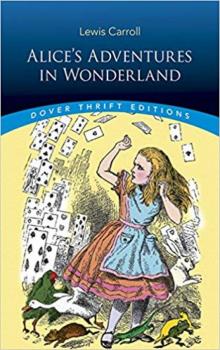 Alice's Adventures in Wonderland
Alice's Adventures in Wonderland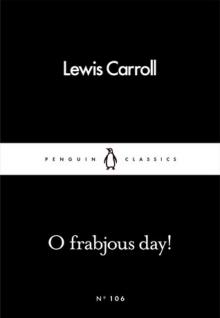 O Frabjous Day!
O Frabjous Day!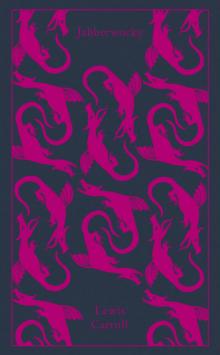 Jabberwocky and Other Nonsense
Jabberwocky and Other Nonsense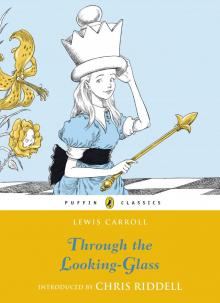 Through the Looking-Glass and What Alice Found There
Through the Looking-Glass and What Alice Found There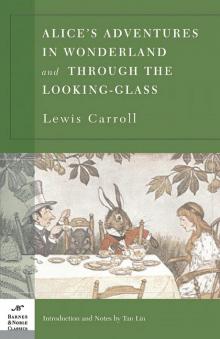 Alice's Adventures in Wonderland and Through the Looking Glass (B&N)
Alice's Adventures in Wonderland and Through the Looking Glass (B&N) Alice's Adventures in Wonderland and Through the Looking Glass (Barnes & Noble Cla
Alice's Adventures in Wonderland and Through the Looking Glass (Barnes & Noble Cla The hunting of the Snark
The hunting of the Snark The Complete Alice in Wonderland (Wonderland Imprints Master Editions)
The Complete Alice in Wonderland (Wonderland Imprints Master Editions) Alice in Wonderland: The Vampire Slayer
Alice in Wonderland: The Vampire Slayer Phantasmagoria and Other Poems
Phantasmagoria and Other Poems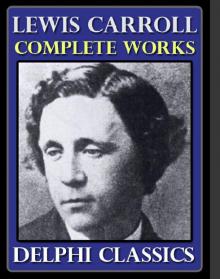 Complete Works of Lewis Carroll
Complete Works of Lewis Carroll Alice's Adventures in Wonderland illustrated
Alice's Adventures in Wonderland illustrated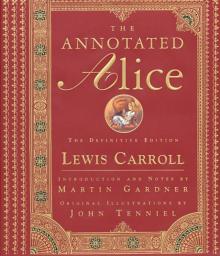 The Annotated Alice: The Definitive Edition (The Annotated Books)
The Annotated Alice: The Definitive Edition (The Annotated Books) Through the Looking Glass
Through the Looking Glass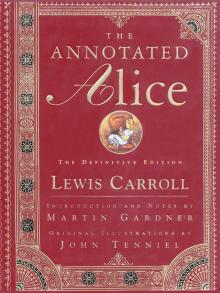 The Annotated Alice
The Annotated Alice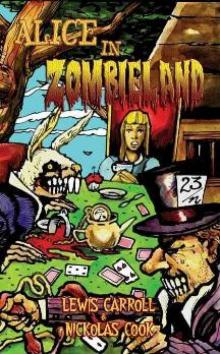 Alice in Zombieland
Alice in Zombieland